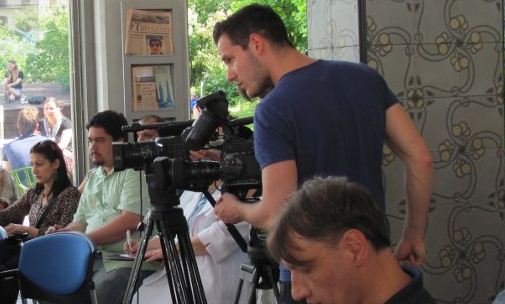Published: 28 November 2012
Region: South-East Europe, Bucharest
by Aidan White

 Any hope that political pluralism and the lure of membership of the European Union might give democracy and media a lift in south eastern Europe is still wishful thinking according to new reports on the state of media in the Balkans.
Any hope that political pluralism and the lure of membership of the European Union might give democracy and media a lift in south eastern Europe is still wishful thinking according to new reports on the state of media in the Balkans.
Twenty years after the fall of communism and 13 years on from the last military action in the region, there is still a poisonous mix of hate speech and intolerance at work in media particularly in Bosnia, Serbia, and Kosovo. And across the region journalists work in an atmosphere of fear and self-censorship.
These are the conclusions of initial country reports from Albania, Bosnia-Herzegovina, Bulgaria, Croatia, Hungary, Kosovo, Macedonia, Moldova, Montenegro, Romania, Serbia, and Slovenia, which were presented at the South East Europe Network for Professionalisation of Media (SEENPM) conference in Bucharest on 16-17 November.
The reports, which will be finalised and published early next year, reveal a picture of media struggling to survive in a suffocating atmosphere of political and corporate corruption.
The most troubling conclusion is that hate-speech, driven by unscrupulous politics, still infects journalism despite the massive investment in media by the international community.
The grim situation was summed up by outgoing Chairman of the SEENOM Remzi Lani, from the Albania Media Institute, who told participants “there is no more fighting on the ground, but media are still at war.”
Over the past 15 years media have changed, but ethnic and religious divisions are still very much in play. There are more online sources, but there is also more hate speech and aggressive dialogue between communities.
At the same time political leaders – even in European Union states like Slovenia and Hungary – are targeting their critics in the media using a mix of political interference and legal intimidation.
Even where there are good laws on the books – and in some countries the statutory rights of journalists and media are word perfect in terms of the law – these guarantees count for nothing because of political opportunism, institutional corruption and weak levels of enforcement.
There are still physical attacks and legal intimidation of journalists. In countries like Serbia, Albania, Bosnia-Herzegovina and Kosovo the problems are made worse for journalists working in areas where media struggle to survive in weak economies.
A common feature of the reports deals with the lack of political commitment to creating a free media landscape. In many countries the default position of political leaders of all colours is still command and control when it comes to dealing with media.
It’s a disappointing balance sheet for those who have witnessed the enormous investment of expert resources and media development funds to help media build a culture of tolerance.
Certainly there are more media, but few make money and often they are in the hands of shadowy forces who remain unknown because of poor transparency rules governing who owns and controls media.
There were some reasons to be cheerful — the Bucharest meeting noted that in some countries public broadcasting is enjoying a revival and some online media are holding political leaders to account, but the overall outlook is wretched and likely to get worse with problems of economic austerity and extremist politics on the rise.
In their conclusions the participants in Bucharest set out plans for more targeted campaigning in the next years to strengthen ethical journalism and to focus on the continuing threat of hate speech and inflammatory reporting.